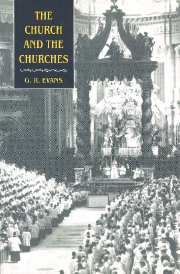Summary
Most of the issues with which this book has been concerned have a long history of debate within the history of the Church, to which we can look to get bearings. ‘Communion’ is a relatively recent addition to the technical vocabulary of at least the ecclesiological areas of systematic theology. It does not appear in Roman Catholic usage in the decrees of councils until as late as the Second Vatican Council. Nevertheless it is now central to ecumenical thinking, and we must place it squarely at the end of this enquiry.
That is not easy to do with absolute clarity. ‘Communion’ is not a univocal term. And its various meanings are not always fully shown even in the most recent work to be related to one another in ways which are themselves unequivocal. There have, however, been some substantial achievements of coordinated definition. The Statement of the Second Anglican–Roman Catholic International Commission, Church as Communion (London, 1991) points out that in the New Testament the term ‘Communion’ (12),
ties together a number of basic concepts such as unity, life together, sharing and partaking. The basic verbal form means ‘to share’, ‘to participate’, ‘to have part in’, ‘to have something in common’ or ‘to act together’. The noun can signify fellowship or community. It usually signifies a relationship based on participation in a shared reality (e.g. 1 Corinthians 10:16). […]
- Type
- Chapter
- Information
- The Church and the ChurchesToward an Ecumenical Ecclesiology, pp. 291 - 314Publisher: Cambridge University PressPrint publication year: 1994



